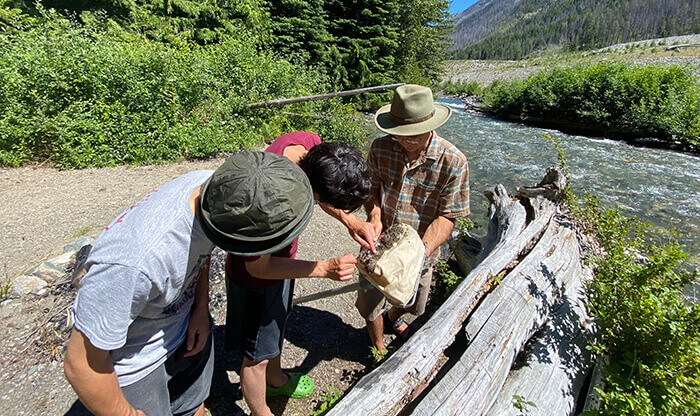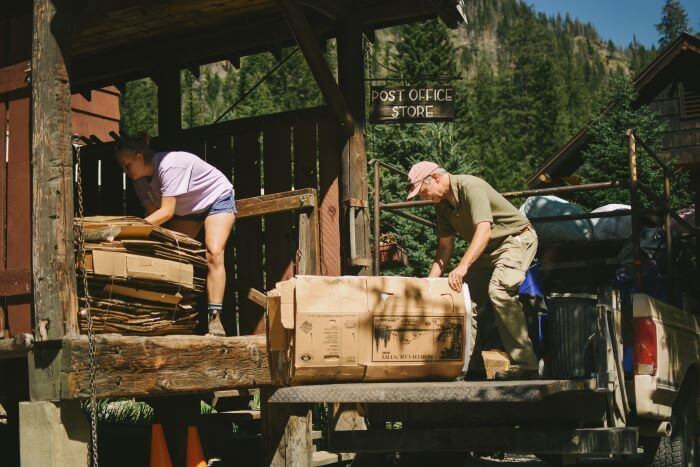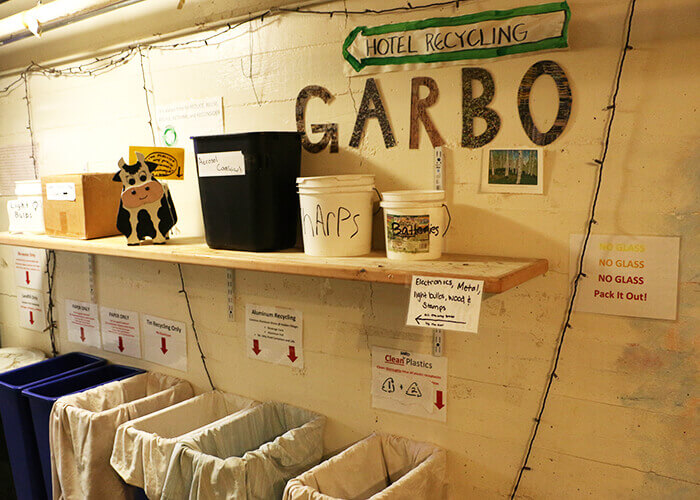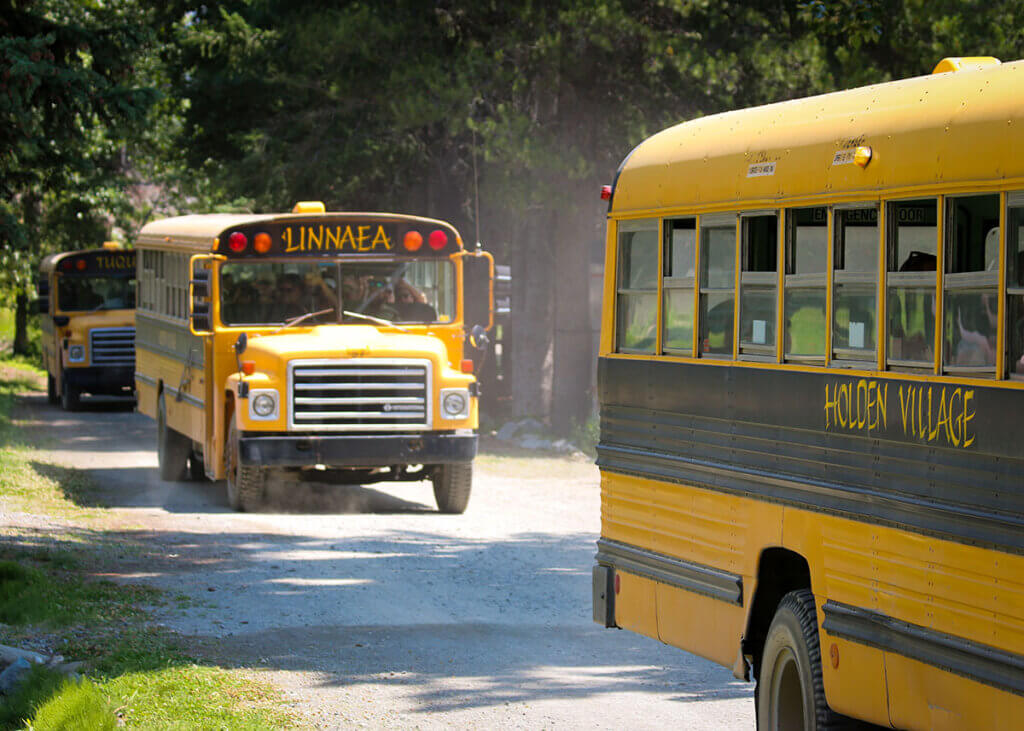Arriving at Holden Village evokes a sense of awe and wonder, the natural beauty of our surroundings is incredible. Holden Village’s unique location in the wilderness offers you a distinctive opportunity to engage with issues of sustainability.
Holden’s mission is to help us renew our relationships with God, the earth, and each other. One of our deeply held values is being connected to our place in creation, in the wilderness, in a way that is respectful and careful.
Holden holds a framework of Earth-honoring faith, in which scientific understanding enhances our relationships with God, the earth, and each other.
As you journey through parts of the Railroad Creek Valley burned in the 2015 Wolverine Creek Fire, you have the opportunity to witness the ecology of renewal as the ecosystem emerges from the natural disturbance of fire.
You will notice many daily practices of the Village, from the way you clean your plate in the Dining Hall to the natural dye used in the Art Studio, invite you to reflect on your relationship with the land around you. The drinking water that comes out of the faucet and the hydroelectricity that powers the lights come from nearby Copper Creek providing you with a unique opportunity to be intimately connected with the land that sustains us.
While there are many practices that help Villagers live more lightly on the earth, Holden Village is also a complicated and nuanced place to talk about sustainability. Holden stands on the land of the Tsi-Laan, the Enteatqua, the P’Squosa, the Wenatchi-Colville and Wenatchi-Yakama Tribal Nations, land that was stolen from the ancestral stewards of this region.
The Village originated to serve the purpose of mining copper, a process that ravaged the land and created large piles of toxic waste that infiltrated the watershed, including Lake Chelan. A federally-mandated remediation process began in the 2010s to address the water pollution by regrading massive tailings piles, planting trees, and moving Railroad Creek to accommodate an underground barrier wall. While greatly beneficial to aquatic life and watershed health, this process used ample fossil fuels to operate machinery to make it possible. All people and goods must travel by a boat powered by diesel to arrive at Holden Village and most visitors travel by cars, trains, buses and/or airplanes that use fossil fuels to reach the boat dock.
While you visit Holden Village, take the opportunity to learn and reflect. What tensions exist in renewing your relationships with God, the earth, and each other? What knowledge, ideas, or practices will you take back down the mountain with you?
The more we learn about the science of the world around us, the more we become aware of our human impact and why it is important to live more lightly on the earth.
Holden Village commits to resources that are necessary, ethically sourced, and sustainable.
As a wilderness community, Holden Village has waste management down to a science, called “Garbology.”
The Holden Village Kitchen is shaped by the conviction that our shared meals contain sacramental elements.
Holden Village is truly off-the-grid, as there is no direct connection to municipal electricity, drinking water, or waste water treatment facilities.
As part of renewing our relationship with the earth, we are taking tangible steps to reduce our carbon footprint.

The more we learn about the science of the world around us, the more we can become aware of our human impact and why it is important to take steps to live more lightly on the earth.
Holden offers environmental learning sessions led by the Village Naturalist and Teaching Faculty. There are educational sessions during the summer months and occasional sessions throughout the year. Past session topics have included fire ecology, mine remediation, plant identification, geology, bird watching, stargazing, macroinvertebrates of Railroad Creek, and more.
Other community science initiatives help Holden Village contribute to monitoring changes due to climate change, including sending daily weather observations to the National Weather Service and participation in the Cascades Wolverine Project.
Holden has also hosted public school groups for environmental education trips. Contact education@holdenvillage.org for more information about bringing your school to Holden Village.

Because of Holden’s remoteness, anything brought to the Village will either need to be consumed, returned with you at the end of your stay, given to someone in the Village, or thrown away and eventually shipped out with our garbage, keeping in mind that there is actually no “away”.
This reality invites us to carefully consider what we purchase and constrain our patterns of consumption. Outside of Holden it might be possible to perpetuate the fiction that what we purchase and discard simply disappears. At Holden that fiction is exposed as a fallacy. Holden Village commits to resources that are necessary, ethically sourced, and sustainable. An important part of the purchasing choices we make is repairability. Staff work to fix broken equipment and divert it from the landfill.
How will you think differently about your purchasing habits after spending time at Holden?

As a wilderness community, Holden Village has waste management down to a science, called “Garbology.”
While you’re in the Village, you can help us by separating your trash, recycling, and compost into the appropriate places.
Once a month, staff members take turns on a Garbology shift and help the Village Garbologist to gather, sort, and tend the Village waste management. We weigh and compost the food waste from the kitchen and the Dining Hall, diverting about 50,000 lbs of food waste in 2018, or 1 pound per person per day that would otherwise be sent to the landfill. The compost is used in our summer garden beds and hanging flower pots as a tangible reminder of the cycle of life.
We sort paper, plastic, and other recycling into large bins that will eventually be packed and shipped out of the Village on a barge. When you see this whole process unfold you are reminded this is always how it is. Garbage and recycling do not simply disappear but are handled and processed. At Holden Village we are a little closer to the process. Knowing this is where everything will eventually end up tends to make you more careful about what you purchase, what you consume, and how you throw things away.
For every ton of plastic that we recycle, we keep 2.5 tons of CO2 out of the atmosphere, and for every ton of paper we recycle, we keep 1 ton of CO2 out of the atmosphere (which saves enough energy to power an average American home for 6 months).
How will you think differently about waste when you leave?

The Holden Village Kitchen is shaped by the conviction that our shared meals contain sacramental elements.
The seemingly simple act of cooking and eating is a complex process of choices and values that form and re-form our relationships with ourselves, with one another, with the Earth, and with the sacred thread that runs through it all.
Holden Village is truly off-the-grid, as there is no direct connection to municipal electricity, drinking water, or waste water treatment facilities.
When you flip a lightswitch, turn up your radiator, or take a hot shower, all those resources need to be brought into the Village by barge as diesel or propane, or ideally collected from what is seasonally available in this valley. Wood from along the road heats our buildings through the winter, while electricity and water come from a nearby alpine stream under the diligent maintenance of the Village utilities team.
Holden Village generates its electricity through a Pelton Wheel hydroelectric power plant that uses water supplied by a diversion off of Copper Creek. This diversion also supplies water for drinking and irrigation. The amount of power available varies seasonally with an excess from late spring into summer, and substantial conservation efforts are required throughout the winter.
In the winter, the primary heat source for our buildings is wood. Throughout the summer and fall, our Mavericks work hard to pull downed logs from the forest along the road and process them for use in our boilers. This has the dual benefit of providing us with a sustainable source of firewood, and protecting the road from wildfires. While burning wood, even downed logs, is not truly carbon neutral, it is the least carbon-intensive heating option currently available to us, and Holden is committed to staying informed of any new developments in this field.
At Holden Village you are intimately connected with electricity generation and the elements inviting mindfulness about consumption. For example, during the winter, there may not be enough power to run clothes dryers or stoves without causing a power outage for the entire Village. Realizing the interconnectedness of our actions on the wellbeing of neighbors on a small scale, demonstrates the impact of our interconnectedness on a national and global scale.
What practices will you take down the mountain with you about energy conservation?

As part of Holden Village’s commitment to renewing our relationship with the earth, we are taking tangible steps to reduce our carbon footprint, guided by the Village’s Strategic Plan:
The Holden Village community examines social and economic power structures that drive climate change and structural injustice, and responds with individual and collective action. -Strategic Plan, Pillar B
Holden Village will lead by example, making its operations carbon neutral by 2025, and the Railroad Creek Valley carbon neutral by 2030 – Strategic Plan, Goal 5
Under the guidance of our 2022 Carbon Neutral Plan, we are working on the following initiatives:
Holden Village is a community where your questions are valued and encouraged. Most programs led by visiting teaching faculty occur during the summer months. However, Holden also invites faculty to teach sessions for special events and retreats throughout the rest of the year.
Check out a list of the 2024 Summer Faculty.